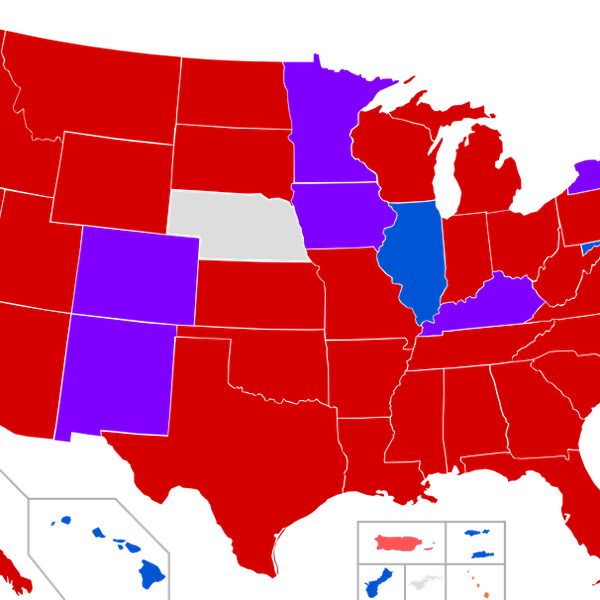We have moved on to the third and final pledge blog, where I talk about future prospects on the issue. Not only does this section address feminization of French, it also touches on what non-binary gendered words would look like in the French language. Here you are:
There is much evidence to support the link between a rigidly gendered grammar and the presence of sexism in society, but there are many different views on how to solve this issue. Even within the feminist movement, there is disagreement on how to address feminization--if the traditionally masculine profession nouns should take feminine forms at all.
The first suggestion of feminization is to create feminine forms of profession nouns that, to date, do not have a feminine form (Rhodes-Robinson, 2007). For example, "le Président" would become "la Présidente" in the instance that a female becomes president. This specific example uses the feminization rule of French nouns where an "-e" is added to the end of the world; we see this method used in the feminine forms of many French adjectives.
However, for words like "le professeur," feminization of the noun is more muddy. If we were to follow traditional French grammar rules on feminizing verbs with the "-eur" ending, we would end up with "la professeuse," since "-euse" is a feminine form of "-eur." However, the ever so posh French Academy does not like the form "la professeuse" because it is deemed ugly-sounding (Rhodes-Robinson, 2007). It would also not be kosher to feminize "le professeur" using the "-e" ending, because the "-e" ending doesn't fit in that spot according to French grammar rules. Thus, "la professeure" would be grammatically incorrect. Another proposition is the potential use of the feminine article but masculine noun, giving us "la professeur." This still wouldn't work, because the feminine article "la" and the masculine noun "professeur" don't agree in gender; it would be incorrect grammar. Yet another suggestion is the use of the word "femme" in front of the noun, giving us something like "une femme professeur" (with the noun kept masculine). This leads into the next issue.
By using an entire extra word, "femme," some feel that this implies gender inequality. This is the view of the feminists who don't want feminine forms of the language. They see a feminine form as an extra disparity between men and women; after all, if we have to create a whole separate form for feminine forms, doesn't that just further the idea that women exist on a lesser playing field than men? This group of feminists want to embrace the masculine form of the word to show that women can do just as good of a job as men. However, this does not solve the issue of textual visibility (or lack thereof for women). Further, it would just give in to the idea that the default for human qualities--the basis off of which society exists--is still masculine (Moscovici, 1997).
Historically, feminine versions of certain nouns have existed, but they have carried different meanings than just simply the female version of a historically male job. Going back to the president example, one might think that "Madame la Présidente" could refer to a female president. It has all the feminization checkpoints: "Madame," the female article "la," and the "-e" ending on "Présidente." Sadly, "Madame la Présidente" has traditionally been used to refer to the male president's wife. If a woman were to hold this office herself, how would people refer to her? Would they use "Madame la Présidente" and risk slight confusion on historical representation? Or would they use "Madame le Président," where even though those are masculine forms, it at least has distinction from the historical equivalent of "First Lady"? Of course, that is, if they don't use the previously mentioned versions of just "la Présidente" without "Madame" added to the front (Leys, 1987).
Undertones of this same sexism carry on into adjectives as well. The world "galant," in its masculine form, means "well-brought-up." However, when being used to describe a female, it must take the "-e" ending, where it becomes "galante." This seems nice and all until one realizes that "galante" has historically meant "easy" or "whoreish." An adjective describing a proper man is used to describe a whoreish woman (Rhodes-Robinson, 2007).
It's interesting to note that many of these problems aren't present in Francophone countries that aren't France. In Québécois Canada, profession nouns have already been feminized to accommodate for females who now hold traditionally male positions. In 1976, the Parti Québécois began their progressive practices. The Québéc National Assembly asked the Office de la langue française (OLF) what a woman should be referred to if she assumed the position of Vice President. The linguists recommended feminization, and the OLF deemed that reasonable. The OLF recognized that the reason many feminized forms didn't already exist were for historical, sexist reasons (Villers, 2007). They ultimately agreed that feminization of profession nouns was the way to go. In 1979, the OLF issued the following statement:
"As for the gender of job titles, the Office de la langue française has recommended the use of feminine forms in all possible cases:
- either adopting the feminine term in common use: couturière (seamstress), infirmière (nurse), avocate;
- or adopting the noun of common gender preceded by a feminine determinative. Examples: une journaliste, une architecte, une ministre;
- or by spontaneously creating a feminine form that respects French morphology. Examples: députée, chirurgienne (surgeon), praticienne (medical practitioner);
- or by attaching the word femme. Examples: femme-magistrat (magistrate), femme- chef d'entreprise (company director), femme-ingénieur (engineer)." (Rhodes-Robinson, 2007).
The women of Québéc are more unified on the way they approach the feminization issue, and the above statement is a starting point for them. The Québécois feel that the feminization of tradtionally masculine profession nouns is a reflection of the natural progression of society, which is contrary to what the French Academy in France believes (Villers, 2007).
We can see here that France is behind in the feminization of nouns compared to its worldwide Francophone counterparts. This could be attributed to the oppressiveness of the French Academy in France, making it hard for language to change (Lariviere, 2001). The disagreements in feminist approaches in France can stem from the differences between American and French feminism. American feminism holds values of men and women being equal, whereas French feminism is all about empowering the woman in her traditional role, found in the home. French suffragettes wanted a right to vote not to be equal to men, but to be able to make more decisions regarding housework (such as when the milk would be delivered or the price of laundry), in order to make them more effective in the home (Dister & Moreau, 2006).
No matter which way the feminization movement goes, the French language hasn't even (officially) begun to consider the plight of non gender binary people. There has been a movement called "écriture inclusive," or "inclusive writing." This would add a "-.e.s" to the end of traditionally masculine nouns to show the resistance on a strict gender binary (Revell, Schuh, & Moisan, 1994). However, many Francophone people have had backlash on this movement, as it changes the fundamental structure and grammar of the language so quickly. No backlash, however, has been as brutal as the French Academy--they called écriture inclusive a movement that is a "mortal danger" to the French language (Rhodes-Robinson, 2007).
There are many, many factors to take into account when considering how to approach this issue. Personally, I think that the feminization route would provide the most benefits to the feminist movement, as it would bring textual visibility (and thus, rights and resources) to women in the traditionally male professional realm. The feminization of language cannot stand alone. It must go hand in hand with the feminist movement, so that the progressive language comes with concrete milestones in feminist agenda. The most efficient and effective way of feminization is still under debate, and it will inevitably be a while before we find a common ground. But at the end of the day, we could always take a few lessons from Québéc.
Sources:
Dister, Anne & Marie-Louise Moreau. 2006. "Dis-moi comment tu féminises, je te dirai pour qui tu votes." Les denominations des candidates dans les elections Europeennes de 1989 et de 2004 en Belgique et en France. Langage et societe 115.5-45.
Lariviere, Louise-L. 2001. Typologie des noms communs de personne et féminisation linguistique. Revue quebecoise de linguistique 29.15-31.
Leys, Michel. 1987. Langage et administration. "Madame le ministre." Le rapport de la commission Groult sur la féminisation des noms de métier, fonction, grade ou titre. Le langage et l'homme 22.40-44.
Moscovici, Claudia. 1997. He is the sun, she is the moon: a feminist sociolinguistic approach to teaching the French language. Women and Language 20.53-58.
Revell, Donald L, Cornelia Schuh & Michel Moisan. 1994. 'Themself' and nonsexist style in Canadian legislative drafting. English Today.
Rhodes-Robinson, Skye. 2007. The Feminization of French Profession Words. Swarthmore College Linguistics Department.
Villers, Marie-Éva de. 2007. The French Language in Québec: 400 Years of History and Life Part Four II - French: A Shared Language Chapter 13 – Which Language for the Future? Inset 82.
Well, I hope y'all enjoyed that little mini-series! I hope even more, though, that you were able to take something away from it. I'm not finished with my research into this topic; now, I'm looking more into the historiography behind the last 400 years of French language. It has always been a controversial topic, and it is still debated heavily. When I have some sort of substance on that subject, I'll maybe interject with another mini-series--who knows?! For now, I'll see y'all next week for the next topic!
- How to Conquer French Gender Rules In a Nutshell ›
- French PROFESSIONS - GENDER (Masculine and Feminine) Les ... ›
- The Literary Glass Ceiling: Gender, Language, and France's ... ›
- The return of the goddess feminization of nouns referring to ... ›
- sociolinguistic aspects of the feminisation of names of professions in ... ›
- The Feminisation of Occupations in the French Language ›
- feminisation of names of professions, functions, degrees or titles in ... ›
- The Push to Make French Gender-Neutral - The Atlantic ›
- Mr T.J.T. (Thom) Westveer MA - University of Amsterdam ›
- The Feminization of French Profession Words ›



















